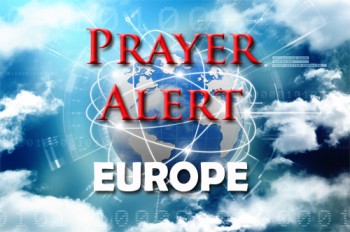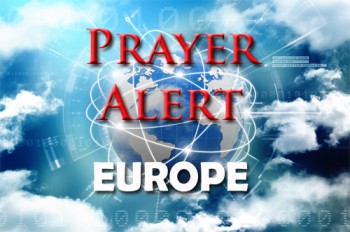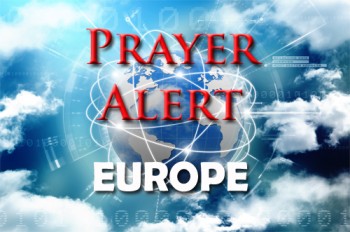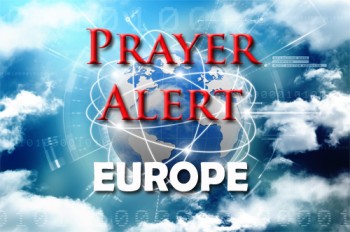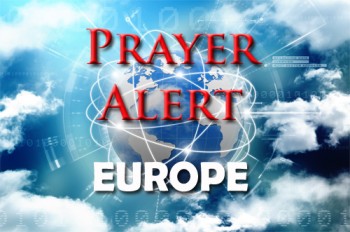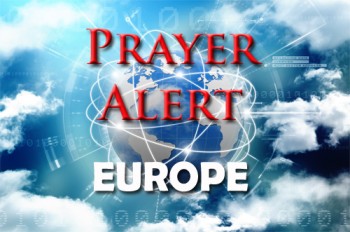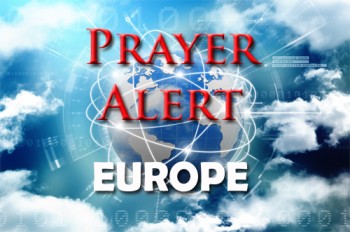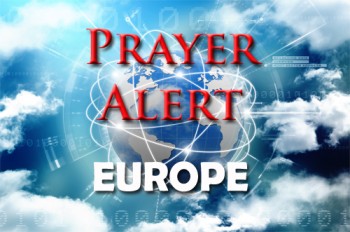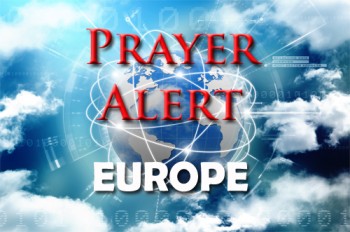Displaying items by tag: Europe
Belarus: protests and sanctions update
Opposition leader Sviatlana Tsikhanouskaya urged the EU to approve sanctions on officials accused of rigging the recent presidential election. Despite six weekends of mass protests against President Lukashenko over the disputed vote on 9 August, the EU has not followed through on its threat to impose sanctions on 40 Belarusian officials. ‘EU leaders have reasons not to push sanctions but I asked them to be more brave’. The opposition leader, who fled to Lithuania after the election, said: ‘Sanctions are important in our fight because they could force the so-called authorities to start dialogue with us in the opposition council.’
Belarus: growing tensions at Ukraine border over Jewish pilgrims
Rosh Hashanah, the Jewish New Year, runs from 18 to 20 September. Hasidic Jews travel to Ukraine every Jewish New Year in their tens of thousands to worship at Rabbi Nahman's tomb. But Ukraine is keen to avoid a spike in coronavirus infections, and Kyiv has closed its borders to foreigners until late September. However, Ukraine has accused Belarus of encouraging more Jewish pilgrims to go to their shared border, as 2,000 (including children) are camped out at the border of the two countries, where charities and pilgrims are running out of food and medical supplies. ‘We are stuck here with no money, no roof, no food or drink’, said Haim Weitshandler. He urged the Israeli government to resolve what he called a ‘humanitarian catastrophe’. Ukraine said that Belarus was ‘exacerbating tensions’ by claiming that the pilgrims will be able to cross the border.
France: return of Yellow Vests
After pausing for the coronavirus lockdown and summer holidays, the Yellow Vests brought their anger back to the streets for a series of protests in Paris and a number of other French cities. Their last major protest was on 14 March, on the eve of local elections. This was just three days before the country went into lockdown for Covid-19. The protests were in defiance of a ban from President Macron over mass gatherings. It is almost two years since the first Yellow Vest protest on 17 November 2018. Their numbers at first soared and then ebbed. The question now is whether they will rise again like a phoenix from the ashes as social dissension grows over Covid restrictions. People fear another outbreak of violence on the Champs-Elysées, where all gatherings have been banned.
Greece: Fire destroys Lesbos refugee camp
A fire has destroyed Greece's Moria migrant camp on Lesbos. 13,000 are sleeping rough in fields, car parks and roads. Authorities have sent three ships to temporarily shelter 2,000 and are working to provide emergency accommodation near the destroyed camp. Germany called the blaze a ‘humanitarian disaster.’ Some locals attacked and prevented fleeing migrants from passing through their village. The UNHCR said it was aware of ‘tensions’ between nearby townsfolk and the migrants. Pray for those working to arrange shelter for 13,000 refugees. 70% are Afghani with 30% from 70 different countries. Authorities placed Moria under quarantine last week after a Somali migrant tested positive for the coronavirus. There are now 35 confirmed cases.
Belarus: Church request prayer
Leonid Mikhovich from the Baptist Union in Belarus said recent events have divided the church, ‘The situation has created a lot of tension in society as well as among Christians and churches. There are several dividing lines between churches so we have a lot of discussions and tensions. The Church in Belarus has historically been separate from politics. During the Soviet Union, the Church was an enemy of the state, and most churches still feel this way today. Consequently, only the Catholic Church has publicly sympathised with the anti-government movement while others have focused on prayer and street evangelism’. Mikhovich has asked Christians around the world, ‘Pray for churches. We need unity in this time, to work together, especially evangelical churches. Pray for our society, to keep us from hate, revenge and bitterness.’
Belarus: Russian influence
On 7th September Maria Kolesnikova, a Belarus opposition leader was forced into a van by masked men. She was next seen on 9th September at the Ukraine border where she prevented officials from forcibly expelling her by tearing up her passport and throwing it out of the car window. She is one of three women who joined forces to challenge Lukashenko in August’s election. The other two, Svetlana Tikhanovskaya, who won 60-70% of votes and Olga Kovalkova, both fled the country. Thousands have been protesting since the disputed vote even though President Lukashenko insisted he will not step down from power. He calls Vladimir Putin ‘big brother’ and is increasingly dependent on Russia for support. In an interview he said that Moscow needs him too, saying, ‘if Belarus breaks, Russia will be next.’ Lukashenko seemed to be saying to Moscow, back me up and Russians won't get any ideas about ousting a long-standing leader through popular protests. Mr Lukashenko will meet Vladimir Putin on 14th September.
Montenegro: ruling party could lose power after 30 years
Montenegro’s election campaign was dominated by divisions over the powerful Serbian Orthodox Church. There have been months of protests since a law was adopted in December allowing the state to seize religious assets when their historical ownership cannot be proved. Consequently the Church urged people to vote against the Democratic Party of Socialists (DPS). The DPS secured 35% of votes in a tight and bitterly-contested parliamentary election, its worst result since the country won independence from Serbia. Official results show the pro-Serbian opposition alliance on 32.5%, meaning that it could feasibly form a government if it can reach consensus with Montenegro's other two opposition parties. That would see the DPS lose control of power in the Balkan nation for the first time in 30 years. The leader of the pro-Serbian coalition, Zdravko Krivokapic, told supporters, ‘The regime has fallen’. The majority of Montenegrins are members of the Church, while President Djukanovic and his party are accused of having links to organised crime and running the country as an autocracy.
Germany: far-right protesters storm parliament building
Germany’s lockdown measures and Covid-19 restrictions provoked a protest march by around 38,000 people. Hundreds of demonstrators breached a security barrier and raced up the steps outside Berlin's parliament building. They were dispersed by police with pepper spray. Some of them held the flag of former imperial Germany, which is used by the Reichsbürger far-right group. President Steinmeier said the use of Reich flags and right-wing provocations was 'an unbearable attack on the heart of our democracy’. He said people had the right to express their anger about the restrictions and to question them publicly, including demonstrations, but his sympathy ends when protesters allow themselves to be used by enemies of democracy and political agitators. Police arrested about 300 people. Pray that Nazi imperial war flags that recall the darkest period in Germany history will be prevented from ever flying again.
Belarus protests: Mass rally keeps pressure on Lukashenko
Tens of thousands have again taken to the streets in Belarus, facing off against riot police to protest against President Alexander Lukashenko.
A huge police presence cordoned off areas such as Independence Square in the capital, Minsk, and the interior ministry reported at least 140 arrests. Protesters chanted "disgrace" and "leave" in standoffs with police.
Belarus has been gripped by mass protests since the 9 August election, widely believed to have been rigged. Mr Lukashenko, who has been in power for 26 years, has said he has no intention of stepping down and denies electoral fraud.
What happened on the streets?
It was very tense, with large numbers of riot police facing off against lines of protesters carrying balloons, flowers and red-and-white opposition flags.
Reporting at the height of the protests, the BBC's Steve Rosenberg in Minsk said there were far more police than on the past two Sundays when similar rallies were held. Some protesters lay down on the road to try to prevent riot police from moving, with others chanting "disgrace" and "go away".
Some mocked Mr Lukashenko on his 66th birthday, carrying a cockroach puppet and chanting "happy birthday, you rat". Many streets were blocked off by police to try to prevent people reaching the main protest areas.
One large group of protesters marched towards Mr Lukashenko's residence at the Independence Palace, which was heavily protected by riot police and water cannon vehicles. Armoured personnel carriers were seen moving in the area, although reports later said they were also seen leaving and that the crowds were dispersing largely peacefully. Other smaller protests were reported in towns such as Brest and Grodno.
Journalists continue to face issues reporting the unrest. On Saturday, the authorities withdrew the accreditation of 17 reporters, most of them Belarusian citizens who have been reporting for foreign media outlets. Two journalists with the BBC's Russian service were among those affected. In a statement, the BBC said it condemned "in the strongest possible terms this stifling of independent journalism". On Sunday, Germany said it was summoning the Belarus ambassador over the revocations of accreditation.
Another Sunday. Another big protest - But this one felt different from previous weekends.
Having cordoned off Independence Square in the centre of Minsk, police made a move against some of the protesters. Following scuffles, suddenly there were riot police everywhere: banging their shields on the ground as a warning, and then pushing demonstrators further down the road.
Russian President Vladimir Putin telephoned Mr Lukashenko on his birthday and reportedly invited him to visit Moscow. It appeared to be the latest sign of Kremlin support for a president who has not always been seen positively by Russia. But Mr Putin has said he has formed a police reserve force to intervene in Belarus if necessary, although "it won't be used until the situation gets out of control".
More info and comment: www.bbc.co.uk/news/world-europe-53966004
Pray for democratic and transparent elections to take place soon
Pray that the brutality being meted out by the police and prison staff in Belarus will stop
Pray for those who have disappeared, allegedly taken by the police; pray for their families and loved ones who are experiencing fear and anxiety over their treatment and fate
Pray that Russia does not unwarrantedly interfere in this situation
Belarus: election protests update
Two senior figures in Belarus's protest movement were given ten-day jail terms at the notorious Okrestino detention centre for organising demonstrations. Olga Kovalkova and Sergei Dylevsky are high-profile members of the National Coordination Council, set up to organise a rerun of the election. Meanwhile teachers gathered outside the education ministry to protest against Mr Lukashenko's threat to sack teachers who fail to back the government. He promised to crack down on his opponents as daily demonstrations swelled into unprecedented, mass protests in Minsk. In her latest video statement from neighbouring Lithuania, opposition leader Ms Tikhanovskaya told the European Parliament that protesters were being ‘illegally detained, imprisoned and beaten’, emphasising the ‘democratic revolution’ was neither pro- nor anti-Russian, nor pro- or anti-European. In Lithuania 50,000 people expressed solidarity with Belarusians by forming a human chain from Lithuania’s capital Vilnius to Medininkai on the border with Belarus.
